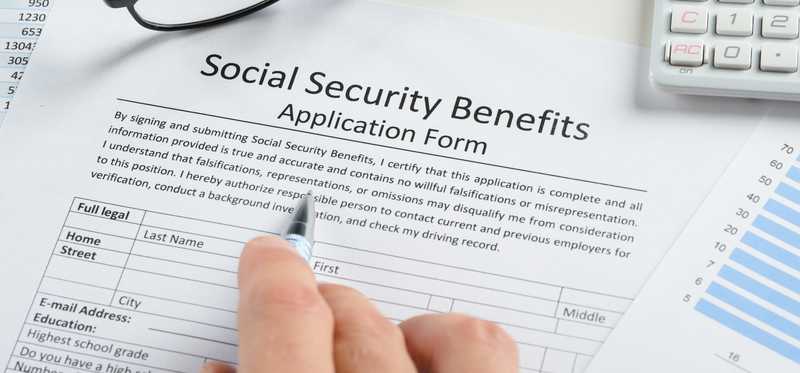7 Good Reasons to Claim Social Security Early

7 Good Reasons to Claim Social Security Early
The most important decision senior citizens will make
There’s arguably no decision that’s more important for seniors than deciding when to take Social Security benefits. After all, more than 3 out of 5 aged beneficiaries today is reliant on Social Security for at least half of their monthly income.
But deciding when to take benefits isn’t as cut-and-dried as you might think.
Ideally, retired workers who’ve earned the prerequisite 40 lifetime work credits needed to qualify for benefits will wait until age 70 before claiming their payout. The reason is simple: Though workers qualify to begin receiving a benefit as early as age 62, their payout will grow by approximately 8% for each year they hold off on their claim, up until age 70. All factors considered (length of work history, earnings history, and birth year), waiting until age 70 is the way to maximize your monthly Social Security check.
However, waiting doesn’t always make sense. For some people, claiming early, despite the permanent reduction to their monthly check, can lead to a higher lifetime payout than if they were to wait. And the key to success with Social Security is to maximize what you receive over your lifetime, not just per month.
With this in mind, here are seven good reasons claiming Social Security early might make sense.
Previous
Next

1. You don’t believe you’ll reach the average life expectancy
Among the many factors to be considered when deciding the right claiming age is your health.
Imagine for a moment that we had two identical people with the exact same work history, earnings history, and birth year. One claimed their benefit as early as possible at age 62, and the other waited until age 70. Though the one who waited receives a higher monthly payout, the person filing early receives a reduced payout, but for eight years prior to the 70-year-old netting his or her first check.
Now, imagine we examined the aggregate payout of these two identical individuals over time. What we’d see is that their lifetime payouts from Social Security would be about equal when they reached their late 70s -- which is right where the average American life expectancy sits at the moment.
Therefore, if you have a chronic health condition that could shorten your life expectancy, or if anyone in your immediate family has passed away before reaching the average life expectancy in the U.S. of just under 79 years, then claiming your benefit early might be a smart way to maximize what you’ll be paid over your lifetime.
Previous
Next

2. You expect Social Security to play no role in your ability to make ends meet
Another reason claiming Social Security early might make sense is if you’ve done a good job of saving for retirement and you don’t need the income provided by the program to make ends meet.
Today’s statistics are pretty glaring. According to an April 2018 Gallup poll, 90% of existing retirees are in some capacity reliant on their Social Security income to make ends meet. Meanwhile, a Gallup survey among nonretirees found that a combined 84% expect to lean on the program in some capacity when they retire. This suggests that only around 1 out of 10 working Americans will save enough over his or her lifetime to not need a dime from Social Security.
Should you be among this minority, claiming your benefits early may offer two benefits. First, it could provide icing-on-the-cake income that allows you to vacation or take up hobbies.
Secondly, by claiming early and reducing your monthly payout, you might, to some small degree, lower your annual federal (and possibly state) income tax bill.
Previous
Next

3. You have no other sources of income or limited earning capacity
Sometimes we may have little choice but to claim Social Security benefits early. For example, if you’re out of work and have no other sources of income, or for whatever reason your earning capacity is limited, it might be in your best interest to claim Social Security benefits early and secure an income stream that’ll allow you to pay your bills.
However, there is a Social Security do-over clause that seniors (especially baby boomers) who’ve struggled to find work should be aware of. Known as Form SSA-521 (officially, Request for Withdrawal of Application), this request allows an individuals’ benefits claim to be undone if submitted within 12 months of first receiving their entitlement. The catch is that you’ll need to repay every cent you’ve received from the Social Security Administration, and, as noted, you only have 12 months to submit your request once you begin receiving benefits.
The beauty of Form SSA-521 is that if you regret claiming benefits early, and you happen to land a well-paying job not long after you begin taking benefits, you have the opportunity to undo your claim and allow your benefits to grow once more.
Previous
Next

4. You’re heavily indebted
More and more, debt is becoming a worry for senior citizens. In 2014, the Consumer Financial Protection Bureau released data showing that the percentage of homeowners aged 65 and up that were carrying mortgage debt had climbed from 22% in 2001 to 30% as of 2011. For folks aged 75 and up, the percentage more than doubled to 21.2% in 2011 from 8.4% in 2001.
Making matters worse, student loan debt is also impacting seniors. According to a Government Accountability Office report from December 2016, the number of student loan borrowers aged 65 and up had increased 385% since 2005. Meanwhile, the aggregate amount of student loan debt these older Americans are lugging around catapulted from $2 billion in 2005 to $22 billion, as of the report.
The solution to this mess may very well be to claim Social Security benefits early in order to put that income to work by reducing debt. But keep in mind that this may not be a fix-all solution, especially since the retirement earnings test could come into play if you’re working and receiving benefits. This could result in some, or all, of your benefits being withheld until you reach your full retirement age.
Previous
Next

5. You’re a lower-earning spouse
Another scenario where claiming early can make a lot of sense is if you’re married and your lifetime earnings are notably lower than that of your spouse.
Ideally, you and your spouse are going to work out a plan to maximize what you’ll receive from the program over your lifetime. This plan will likely involve allowing the larger of the two incomes to grow as much as possible. Letting the larger payout accrue 8% per year is going to make a bigger difference down the line than if the smaller payout were allowed to grow over time.
However, married retirees are still going to want some form of income. That’s where the lower-earning spouse comes into play. By claiming benefits early, the lower-earning spouse ensures that the couple is generating at least some income during retirement.
Obviously this scenario depends on other factors, such as the size of the couple’s nest egg and their health. Nevertheless, it can be a smart way for a lower-earning spouse to contribute, while giving the higher-earning spouse the time to allow his or her benefit to grow.
ALSO READ: How Will Your Social Security Strategy Affect Your Spouse?
Previous
Next

6. You’re confident in your ability to grow your money at greater than 8% per year
Claiming Social Security benefits early might also make sense if you believe that you can consistently outpace the 8% return you’d receive each year by holding off on your claim between ages 62 and 70.
Why would someone believe they can top an 8% annual return with consistency? As an example, since hitting its Great Recession low in March 2009, the broad-based S&P 500 has risen 327%. That’s an annualized return through Aug. 19, 2018 of about 16.6% per year. If you’d taken your Social Security benefits and invested them into stocks since March 2009, there’s a pretty good chance you’d have beaten the 8% annual return you’d get with Social Security.
However -- and this is a very big “however” -- the data I provided above involves some serious cherry-picking. Historically, the stock market has returned 7% per year, inclusive of dividend reinvestment and when adjusted for inflation. Since timing investments in the stock market can’t be done with any long-term consistency, the data would suggest that your chances of finding an investment (stock market related or not) that can top 8% annually on a regular basis are pretty slim.
In other words, this is an option that very few people are going to find attractive or worthwhile.
Previous
Next

7. You worry about Congress’s ability to fix Social Security’s issues
Finally, taking Social Security early could make sense if you foresee trouble ahead for the program and have little faith in lawmakers’ ability to fix it.
According to the newest annual report from the Social Security Board of Trustees, the program will begin burning through its $2.9 trillion in asset reserves this year. Though this net cash outflow will start off very small -- $1.7 billion in 2018 and $0.2 billion in 2019 -- it’s expected to balloon to $169 billion in 2027. By 2034, the Trustees believe that Social Security’s $2.9 trillion in excess cash will be completely depleted.
Now, before you panic, Social Security will continue to pay eligible beneficiaries, even without any extra cash in its coffers. Its payroll tax and the taxation of benefits will ensure that happens.
But the Trust’s net cash outflow is an indication that the current payout schedule isn’t sustainable. The Trustees estimate the need for an across-the-board cut to benefits of up to 21% by 2034. Put in another context, claiming benefits early, even at a reduced rate, may allow you to generate more in lifetime income than if you waited a few years for a higher monthly payout, but were eventually hit with a 21% reduction in benefits.
Admittedly, though, it’s impossible to predict how long it’ll take Congress to act, or what lawmakers on Capitol Hill will eventually do to amend the program. That makes an early claim based on Social Security’s long-term issues a bit of a gamble.
ALSO READ: Could This Simple Fix Really Solve Social Security's Problems?
Previous
Next

There is no perfect claiming age
Ultimately, seniors have to understand that there is no perfect claiming age or concrete guideline that ensures they’re making the best possible choice. Not knowing our expiration date, how Congress will tackle Social Security’s problems, or how investment markets will perform, means the best we can do is assess our financial, health, and marital status, and make a decision that gives us the best chance to earn as much as possible over our lifetime from Social Security.
Sean Williams has no position in any of the stocks mentioned. The Motley Fool has no position in any of the stocks mentioned. The Motley Fool has a disclosure policy.
Previous
Next
Invest Smarter with The Motley Fool
Join Over Half a Million Premium Members Receiving…
- New Stock Picks Each Month
- Detailed Analysis of Companies
- Model Portfolios
- Live Streaming During Market Hours
- And Much More
READ MORE
HOW THE MOTLEY FOOL CAN HELP YOU
-
Premium Investing Guidance
Market beating stocks from our award-winning service
-
The Daily Upside Newsletter
Investment news and high-quality insights delivered straight to your inbox
-
Get Started Investing
You can do it. Successful investing in just a few steps
-
Win at Retirement
Secrets and strategies for the post-work life you want.
-
Find a Broker
Find the right brokerage account for you.
-
Listen to our Podcasts
Hear our experts take on stocks, the market, and how to invest.
Premium Investing Services
Invest better with The Motley Fool. Get stock recommendations, portfolio guidance, and more from The Motley Fool's premium services.